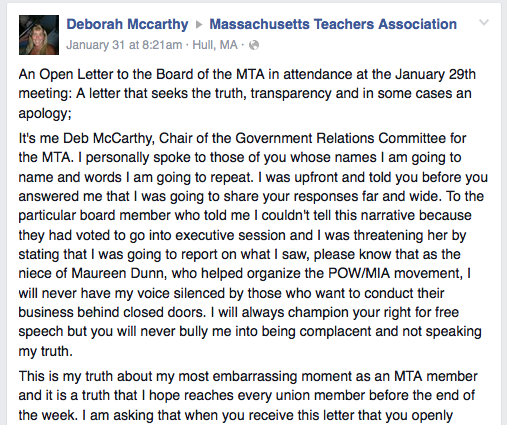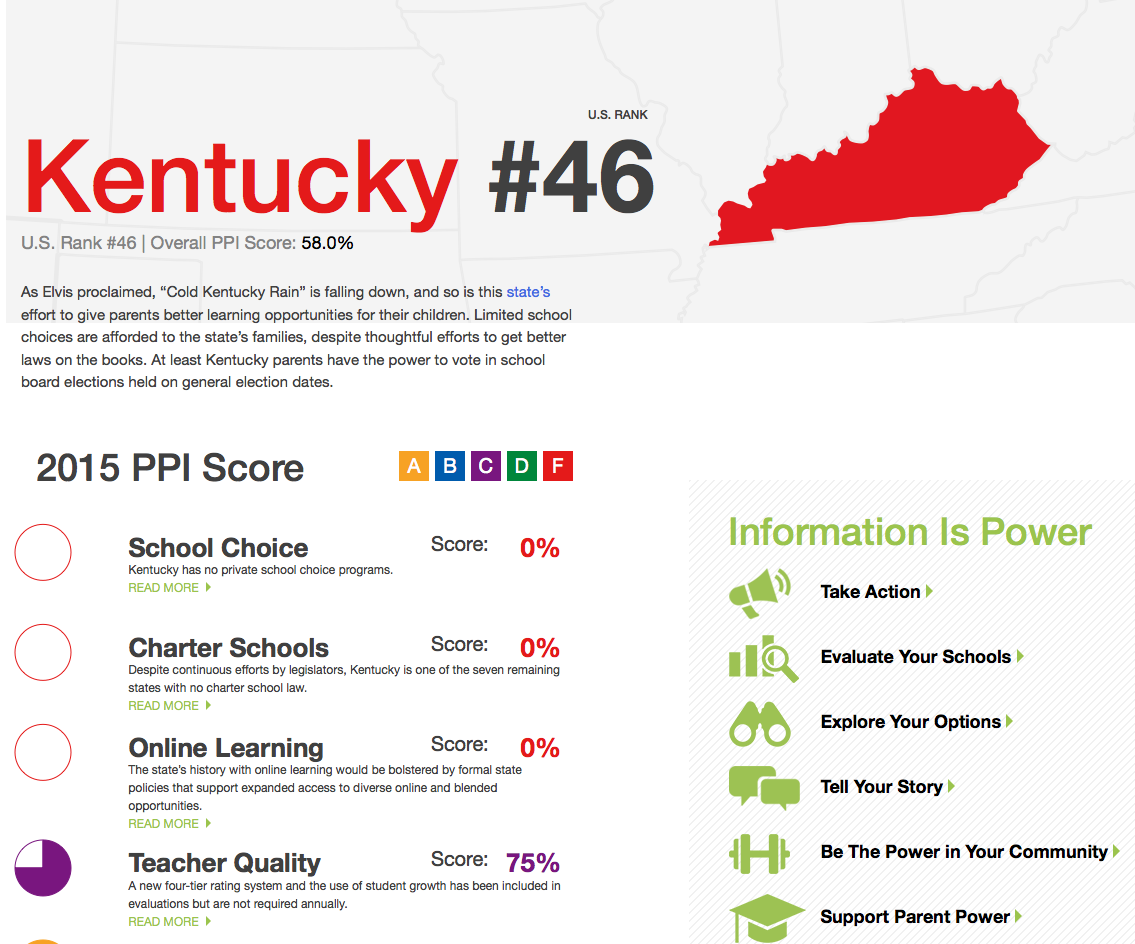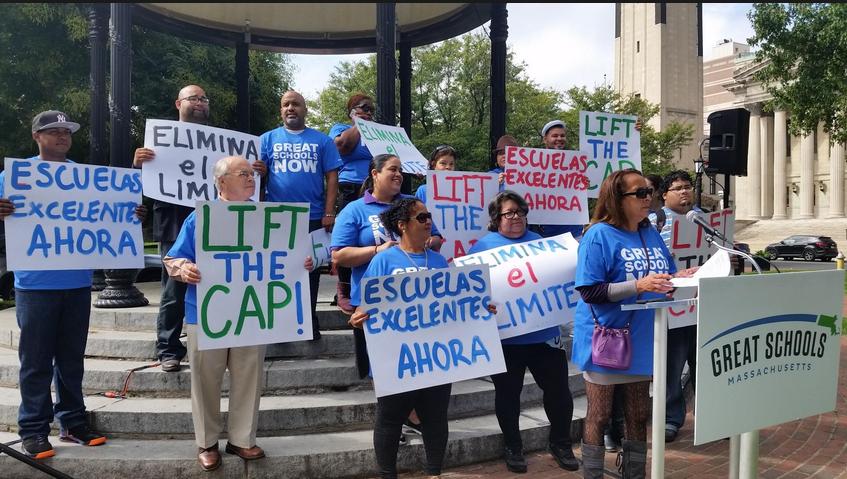
Vol. 18, No. 6
SECRET MEETINGS IN MA. When Four Rivers Charter Public School principal Peter Garbus showed up to what he thought would be a public discourse on charter schools with Senate President Stan Rosenberg as lawmakers are feeling the pressure to lift the cap for 37,000 on waitlists, he was dismayed and shocked when he was asked to leave. “What happened was a partisan, closed-door meeting to organize opposition to charter schools, he said. Speaking of closed-door meetings, the MA teachers union decided to hold an executive session about slowing down their nearly $10 million plan to fight the charter cap lift. The meeting left the union chair of the government relations committee in tears as she wrote on Facebook, “at a time when we needed to push internal politicking aside and fight tooth and nail for our teachers and students… We cannot expect our legislative friends to be accountable for their votes if our own union wants to vote in secret.”
the cap for 37,000 on waitlists, he was dismayed and shocked when he was asked to leave. “What happened was a partisan, closed-door meeting to organize opposition to charter schools, he said. Speaking of closed-door meetings, the MA teachers union decided to hold an executive session about slowing down their nearly $10 million plan to fight the charter cap lift. The meeting left the union chair of the government relations committee in tears as she wrote on Facebook, “at a time when we needed to push internal politicking aside and fight tooth and nail for our teachers and students… We cannot expect our legislative friends to be accountable for their votes if our own union wants to vote in secret.”
 TAKE ACTION. Ask Massachusetts lawmakers to give 37,000 students, and others, a chance to attend the schools they want, and deserve.
TAKE ACTION. Ask Massachusetts lawmakers to give 37,000 students, and others, a chance to attend the schools they want, and deserve.
TN POTENTIAL. While we applaud potential action on school choice, it makes no sense that the legislature would continue to ban partnerships with tax-paying management companies that local groups believe could help them accomplish their educational goals. TN’s charter law prohibits instructional partnership with for-profit management companies, thanks to teachers associations and school boards who are threatened by the potential of top-notch charter schools being built in The Volunteer State. Not allowing these partnerships is extraordinarily un-American, and mind-boggling considering partnerships that already exist in our traditional district schools!
 PRIORITY SCHOOLS. The Jefferson Co. KY school board will discuss what to do with eight struggling schools labeled “priority schools” this evening. To remove the “priority” designation, schools must get out of the bottom 5% and have grad rate above 70% for three consecutive years. The real “priority,” however, should be getting more options for kids since research reveals at-risk students in charter schools & other schools of choice more likely to graduate.
PRIORITY SCHOOLS. The Jefferson Co. KY school board will discuss what to do with eight struggling schools labeled “priority schools” this evening. To remove the “priority” designation, schools must get out of the bottom 5% and have grad rate above 70% for three consecutive years. The real “priority,” however, should be getting more options for kids since research reveals at-risk students in charter schools & other schools of choice more likely to graduate.
HAPPY ANNIVERSARY TFA. Congrats to Teach for America, our longtime ally in the battle for great schools, as they celebrate 25 years!
COULSON’S LEGACY. We’re shocked and saddened by the passing of Andrew J. Coulson, Senior Fellow in Education Policy at CATO. A beautiful tribute from his colleagues noted, “When Andrew wanted to fix something, he went to work.” Indeed, he did, as reflected in one of our favorite pieces of his that tackles a NCES voucher study and the media’s dramatic and inaccurate take on it head on. As with John Chubb, we will work to ensure Andrew’s legacy will not be forgotten.












 se gridiron warriors, advocates of school choice in Kentucky have struggled and persisted in their efforts to enact a charter school law.
se gridiron warriors, advocates of school choice in Kentucky have struggled and persisted in their efforts to enact a charter school law. 

 by Jeanne Allen
by Jeanne Allen




 odies a collaborative momentum toward closing the achievement gap… and a school-wide drive toward excellence, [where] every student at CPA feels like a champion.”
odies a collaborative momentum toward closing the achievement gap… and a school-wide drive toward excellence, [where] every student at CPA feels like a champion.”
On Elections, the Impact of New Hampshire, and the Importance of Education
by Jeanne Allen, Founder & President Emeritus
As the American people are digesting the results of the 2016 New Hampshire primary, and the news media are acting like the contest for president is over, a reminder of how Democracy in America works in is order.
Over 150 years ago, de Tocqueville called the four-year cycle of presidential elections a “revolution… in the name of the law,” writing:
“Long before the appointed day arrives, the election becomes the greatest, and one might say the only, affair occupying men’s minds… As the election draws near, intrigues grow more active and agitation is more lively and widespread. The citizens divide up into several camps… The whole nation gets into a feverish state…”
Wait, you mean that this isn’t the first year people wanted to send a message? The reality is that – thankfully, for the cause of education – the New Hampshire primary is just the beginning. Democracy matters, and for the media and the pundits to begin to declare winners and losers long before November is an assault on what we stand for: knowledge and the cause of opportunity for all Americans.
Those of us engaged in education know that knowledge matters. In the spirit of knowledge (as well as improving the institutions that help many arrive at such knowledge, namely schools), here are a few American government basics for the voters (and a candidate or two?) of what this Democracy in America that de Tocqueville reported is all about:
1. Many people feel disenfranchised, lacking basic education, work, housing and support. “If ever freedom is lost in America,” de Tocqueville cautioned, “that will be due to the … majority driving minorities to desperation…” But our common sense, he predicted, would most often prevail.
2. Despite widespread frustration with the status quo, and a very conflicted populous that changes their opinions day to day, New Hampshire is a state, not a nation. The great democratic contest for the next president goes on for another nine months. (Sorry candidates – it’s not over!)
3. Presidents do not abolish agencies. Congress makes laws, presidents execute. Even abolishing agencies – say the Department of Education – does nothing to the programs that exist within them. You want to change education? You change state laws. Presidents can lead, recommend and cajole, not end state or federal efforts. Even a united Congress has difficulty doing that.
4. Saying education should be about local control ignores the fact that the only people who have the control are school boards and teachers unions. Assigning children based on zip codes bestows no power on those who need it the most – parents. This has been the case since 1965, unless states have pushed those institutions to reform or adopt various charter school or choice programs.
As we move toward the next round of contests, let’s check our candidates every step of the way on what matters most to making education – and by extension our nation — great. Rather than responding to aspirational talk, for starters, we should be asking:
For the guardians of education reform, there has never been a more important moment in history. Let’s be educated about the stakes, and educate our neighbors and our fellow citizens to distinguish between the reality and the rhetoric.